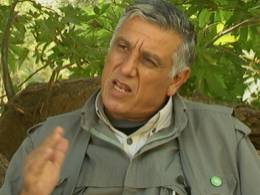 MEDYA REGIONS, — Cemil Bayik a member of the KCK (Kurdish Communities Union) Executive Council stated that 2012 will witness violent clashes and it will be a year of an unavoidable democratic solution and the end of AKP’s aggressive policies.
MEDYA REGIONS, — Cemil Bayik a member of the KCK (Kurdish Communities Union) Executive Council stated that 2012 will witness violent clashes and it will be a year of an unavoidable democratic solution and the end of AKP’s aggressive policies.
Speaking to ANF Cemil Bayik assessed 2011 in these terms: “With an intense political struggle in the first six months, our movement had given a huge political struggle in 2011. Despite the fact that the Turkish state didn’t present solution policies, we determined the year of 2011 as the year of ‘either democratic solution or struggle’. While not giving a positive reply to the opportunity offered by our Leader Abdullah Ocalan, the Turkish state imprisoned our deputies from the first day and followed an extortion policy on the BDP. The AKP government’s elimination moves and attacks against the Kurdish Liberation Movement were as a matter of fact not a secret for us. The AKP government wants to become the main power of the government by asserting its special war system as of democratic and giving an effort to inactivate all opponents”.
In regard to the resistance of the guerrillas in 2011 Bayik stated, “The Turkish state has been planning to defeat the guerrilla power and to weaken the public base of the Kurdish Liberation Movement. In consideration of these truths, 2012 will be a year of an unavoidable democratic solution and the end of AKP’s aggressive policies. It will be a year of a vehement struggle owing to the policies followed by the AKP”.
“Denying the reality of the fact that the Kurdish people should govern themselves and dismissing democratic demands as ‘the will to found a second state in the state’, the AKP has displayed an apparent attitude against a democratic solution. The year 2012 should therefore not be expected to pass differently and softly. Despite the fact that we tried to settle with Turkey without the intervention of external powers, the AKP government failed to take a single step in this regard. The struggles given in 2012 will not only be influential in the forming of the Middle East but they will also determine the position of both Turkey and the Kurdish people. The process of a political struggle will be undeniable when considering the Turkish state’s plans to form a regional order without Kurds” Bayik continued.
The Kurdish problem, remarked Bayik “will be handled as a part of international and regional policies from now on. More precisely, the struggle of the Kurdish people and the future shape of the Kurdish problem will be affected by international and regional struggle as well as the dynamics that will give a shape to the region”.